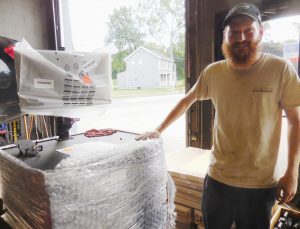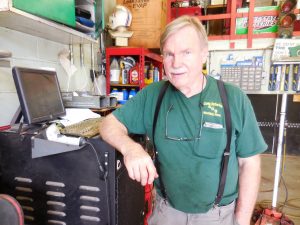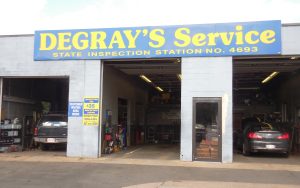WESTFIELD – Rumors abound about the impending changes in vehicle inspection set to go into effect October 1. According to inspection service stations, the changes won’t be affecting the motorist.
“Everybody seems to be freaking out about the new system, but it doesn’t affect them at all,” said Nino Bruno, inspector at DeGray’s Service on Meadow Street in Westfield. Bruno said all of the laws and regulations are the same, as is the price, $35 for an inspection.
Bruno said that every eight to ten years, Massachusetts switches contractors, which is what has happened here. With a new contractor, comes a new system, he said. He said the new equipment has arrived, but inspectors aren’t allowed to touch it until the new contractors come to set it up.
According to Judith Riley of the Massachusetts Registry of Motor Vehicles, the state is in the process of transitioning between contracted vendors to install and maintain the vehicle inspection network. The RMV licenses all vehicle inspectors and inspection stations. The equipment that is used by stations and inspectors is sold, installed and maintained by the third party vendor. The contract for the current network vendor, Parsons Technology, expires September 30, 2017 and the system will transition on October 1, 2017 to the new vendor, Applus.

Nino Bruno, inspector at DeGray’s Service, with newly arrived workstation still under wraps. (photo by Amy Porter)
The cost of the new basic light duty workstations to be paid by the inspection station is $5,810 or $6,810 for a heavy duty workstation for commercial vehicle inspections, which includes the cost for new fraud deterrent and detection features with 5 cameras per inspection bay, an enhanced sticker technology as well as rugged wireless equipment, robust cabinet and an additional printer, according to the RMV.
Of the 5 cameras in each inspection bay, three are video wall mounted, one is workstation mounted, and one is handheld. The handheld camera will be used to take four mandatory pictures prior to all inspections-front license plate, rear license plate, VIN plate and odometer. It can also be used to capture and support safety defects on vehicle, i.e. body rot, windshield cracks, etc.
Bruno said the video cameras won’t bother them. “We’ve got security cameras here. When we have had an issue with the state in the past, we’ve called it up on the cameras and contested it. They’re for our own use,” he said.
“Don’t panic at all. It’s not going to affect the motorist at all, unless you have a wicked illegal vehicle you’ve been trying to skate by with,” Bruno added.

Frank Scigulinsky, owner of Center City Service on Russell Road in Westfield with the old workstation. (Photo by Amy Porter)
Frank Scigulinsky, owner of Center City Service on Russell Road in Westfield, said the new machine which has already arrived costs $20,000, but “the state is picking up part of the tab.” He expects to pay a one-time fee of around $6,500 for the new machine, but said there is also a monthly payment plan available.
“Basically, they just want it done right,” Scigulinsky said about the new equipment. He attended a class on Monday to learn more about it. “There’s going to be a head set. They can come on and watch you, and they can also call you up with a pop-up on the computer screen, and have you put on a head set and talk to them,” Scigulinsky said.
Riley said the video equipment will not be replacing the role of the licensed inspector. Whether a vehicle meets all the applicable safety and emissions system requirements will be based on the inspector’s determination. The cameras will record the inspection, but they do not have the capacity to identify defective equipment, e. g. the cameras cannot stop an inspection and fail a vehicle for a cracked windshield. An inspection would only be interrupted if the data in the system for the vehicle being inspected does not match the data of the vehicle actually being inspected, in which case a video conference can occur to resolve any discrepancies.
Scigulinsky said at the class, they were told, “If you guys are doing it right, you have nothing to worry about.”
Scigulinsky said he thinks inspections will take a little more time, at first. “I think it’s going to take a little more time for each one, but with repetition, we’ll do it quicker,” Scigulinsky said.
“Time will tell,” said David Lecrenski, owner of Lecrenski Bros. on Clifton Street in Westfield. He said with the new computer and new system to get up and running by October 1, he’s hoping for a smooth startup.
Lecrenski Bros. is a Class D. inspection station, which can inspect the biggest trucks to the smallest vehicles, and which he said is a lot more involved. He said his total investment in the new equipment is $12,000.
“I think in the long run, it will be a little more accurate inspection,” Lecrenski said, adding that there are safeguards to prevent problems. He said he chose to go with Bluetooth wireless testing equipment. He said the difference in emissions testing for example is a small lead versus a big long cord. “So we’ll see how that works,” he said
“We’re all set, ready to go. We’re just waiting for the new contractor to install the cameras and computer,” Lecrenski said, adding that since October 1 is on a Sunday, he doesn’t anticipate the system to be up and running until the following Tuesday.
All three inspectors said they’ve heard rumors that some people are not going to sign out the new equipment, but nobody knew first hand if that were true. “I’m sure some will drop out,” Lecrenski said.
However, according to the RMV presentation, all 1,762 current licensed inspection stations have signed up for the new program. Massachusetts signed a 5-year contract with Applus Technologies in October of 2016, which allows for three, 1-year renewal options. The Initial 5-year contract is $29,084,000, paid from revenue generated by the $35 inspection fee. For each $35 paid for the test , the Inspection Station keeps $23.50. The Commonwealth pays Applus $1.343 (A decrease in vendor fee of $.557 over previous contract), and retains $10.157. After 4.4M inspections are conducted, the vendor fee is reduced to .43 per inspection.
According to the RMV, Applus has never missed an implementation date.



